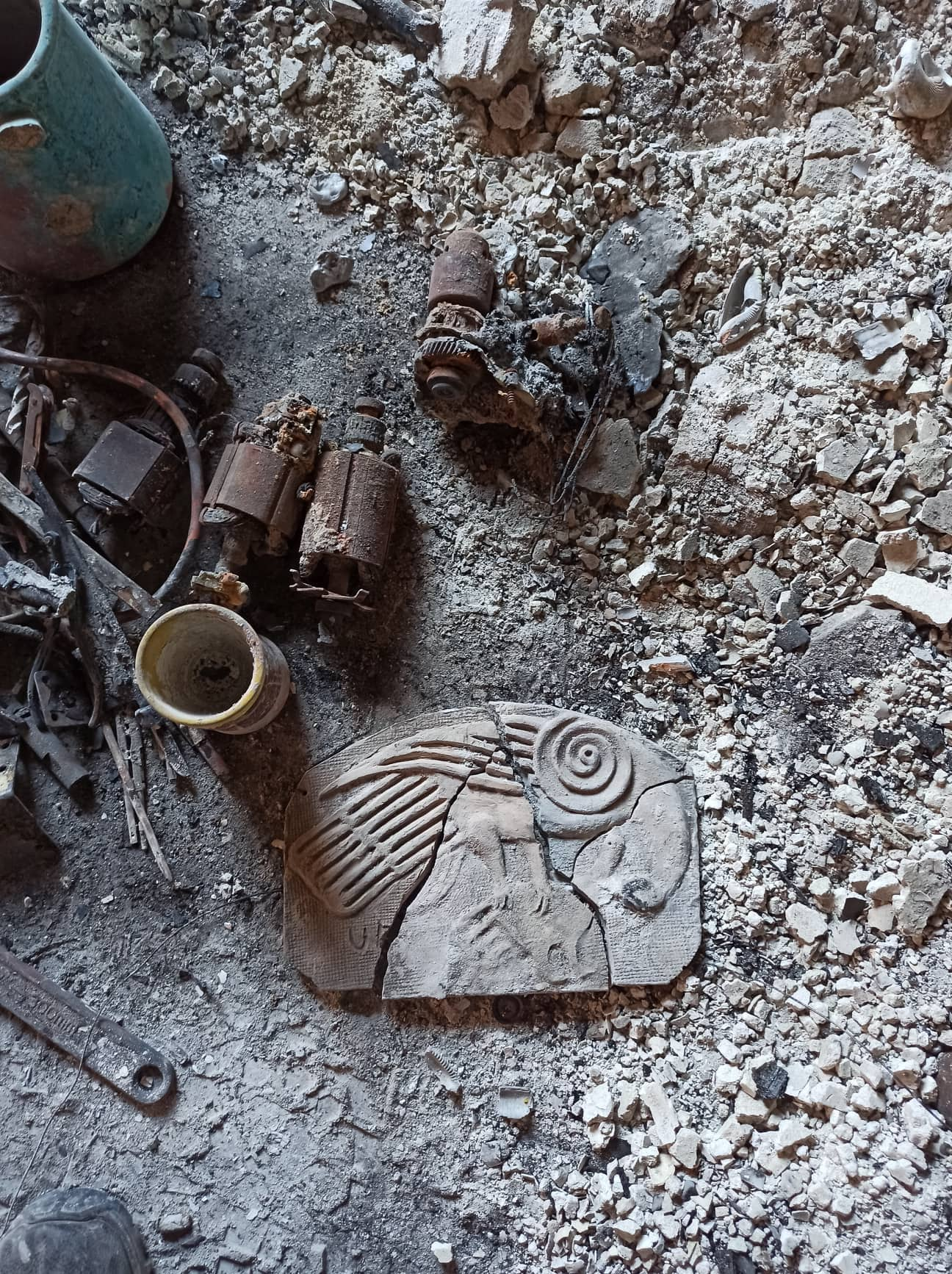A Mute Witness to History | Collective exhibition
Opening: 16.06, 18:00
16.06–3.09.2023
Municipal Gallery Arsenal, Szyperska 2/6–8
Curator: Marta Brennenstuhl-Bludnik
Participants:
Anton Derbilov (1980–2023)
Alexander Demchenko
Iryna Kalyuzhna
Anna Manankina
Andrii Pinchuk
Artem Samoylov
Arsentiy Samoylov
Organization: Municipal Gallery Arsenal in Poznan
Patronage: Magdalena Abakanowicz University of the Arts Poznan

The history of the exhibition began on April 29, 2022, when Artem Samoylov left for a moment his studio in a village near Kharkiv. Little did he know back then that he was last crossing the threshold of a building which a moment later would turn into a pile of rubble, ablaze before his very eyes. Fortunately, no one was hurt or killed, yet the missile dealt a tragic blow to human art. The casualties included bronze sculptures, nudes, busts, and studio works by the artist’s son, Arsentiy Samoylov, who was practicing his craft before his university entrance exams. The remains of the artworks were recovered from the ruins of the studio. The sculptor, Andrii Pinchuk, also lost his lifetime’s oeuvre during the shelling of the city of Irpin. His apartment and studio were totally destroyed. The artist was in the process of preparing for a large and highly anticipated solo exhibition in Kiev. Works that had not been shown before, including the most recent productions, were lost before any photographic documentation had been made. A small part of the artist’s extensive oeuvre survived, though not without damage. This includes a sculpture bearing the telling title Meditation. It depicts a contemplative Ukrainian Cossack who, although burned and maimed, ultimately won the battle against an enemy missile. For the artist’s loved ones, the sculpture has become a symbol of the indomitable Ukrainian spirit.
Soon after Russia’s attack on Ukraine, Iryna Kalyuzhna decided to leave her hometown of Kharkiv. In a hurry, she ripped her canvases from stretchers and rolled them up in a handy scroll. She also grabbed hold of the precious original folk shirts she had been collecting for years. Her art has not suffered in a direct way but has become, like its author, a refugee. Not only did the war deprive the canvases of a “home”, but it also influenced the painter’s subsequent work. Paintings created after February 2022 abound in symbolism related to national identity. The work I Am Ukraine, which we present as a projection, emphatically defines the identity of the author and her art.
The current situation in Ukraine clearly impacts the perception of native artists. It provokes shifts in the subject matter and calls for extreme emotions, becoming a kind of testimony, a record, and a message. The subject of the war’s stigma is referred to by Kharkiv-based interdisciplinary multimedia artist Anna Manankina in the installation Natural History of Destruction. In her current works, Manankina examines the impact of digitization and documentation of war on our mental and physical state. In turn, the subject matter of the works of Kharkiv-based artist Alexander Demchenko changes direction and heads straight to the enemy line. The installation anti-tank barrage began to take shape during the war. It is a construction composed of human figures, evoking the confrontation of civilians standing in the way of Russian tanks. Demchenko’s work symbolizes the resistance of Ukrainian society.
Ukrainian artists must creatively deal with the new reality. Their art assumes the face of a victim, like the charred and broken sculptures of Pinchuk or Samoylov, with no chance of returning to their original state. It becomes a covert and coiled refugee, constantly changing location, anxiously waiting like Kalyuzhna’s canvases. It wants to manifest, to fight for its voice to be heard, to be topical and useful like Manankina’s installations. This art tries to give an account of the state of affairs, like a war reporter, or to resist the aggressor, like Demchenko’s work, for example.
The exhibition titled A Mute Witness To History presents a little-known side of the war taking place behind the Polish border. It features profiles of artists from the most affected regions of Ukraine, such as the Kharkiv area and Irpin; these artists have either lost their works or have had to leave their creative work space. It is a tangible record of the consequences of the clash between art and war. The destroyed works are supplemented by photographic documentation showing their original condition, as well as private recordings showing the moment the sculptures were lifted from the rubble and films documenting the destroyed buildings. In addition, the exhibit includes fragments of the acting body in the form of bullet fragments, which now, in the context of the works on display, look like an abstract sculpture bearing a powerful load of war atrocities. Sculptor Anton Derbilov was to participate in the exhibition, presenting the works for which he was best known, such as miniature military and historical sculptures. As the war broke out, the miniature heroes were replaced by real ones, and he himself joined those fighting for his country. On April 6, 2023, he was killed in mortar fire during the fight to liberate Kreminna in the Luhansk Oblast. All the other participating artists wish to dedicate the exhibition at the Arsenał to his memory.
The exhibition captures the effects of the war without any retouching and depicts the mute witnesses to the war in order to absorb their cries with all the senses.
Marta Brennenstuhl-Bludnik
- Author: o.petrenko
- Published on: 14.06.2023, 14:38
- Last edit: 14.06.2023, 15:38
